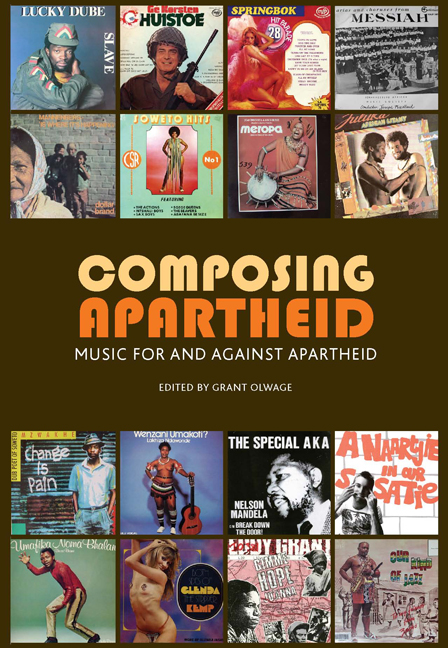Book contents
- Frontmatter
- Dedication
- Contents
- Acknowledgements
- Introduction
- Chapter 1 Back to the Future? Idioms of ‘displaced time’ in South African composition
- Chapter 2 Apartheid's Musical Signs: Reflections on black choralism, modernity and race-ethnicity in the segregation era
- Chapter 3 Discomposing Apartheid's Story: Who owns Handel?
- Chapter 4 Kwela's White Audiences: The politics of pleasure and identification in the early apartheid period
- Chapter 5 Popular Music and Negotiating Whiteness in Apartheid South Africa
- Chapter 6 Packaging Desires: Album covers and the presentation of apartheid
- Chapter 7 Musical Echoes: Composing a past in/for South African jazz
- Chapter 8 Singing Against Apartheid: ANC cultural groups and the international anti-apartheid struggle
- Chapter 9 ‘Nkosi Sikelel' iAfrika’: Stories of an African anthem
- Chapter 10 Whose ‘White Man Sleeps’ Aesthetics? and politics in the early work of Kevin Volans
- Chapter 11 State of Contention: Recomposing apartheid at Pretoria's State Theatre, 1990–1994. A personal recollection
- Chapter 12 Decomposing Apartheid: Things come together
- Chapter 13 Arnold van Wyk's Hands
- Contributors
- Index
Introduction
Published online by Cambridge University Press: 20 April 2018
- Frontmatter
- Dedication
- Contents
- Acknowledgements
- Introduction
- Chapter 1 Back to the Future? Idioms of ‘displaced time’ in South African composition
- Chapter 2 Apartheid's Musical Signs: Reflections on black choralism, modernity and race-ethnicity in the segregation era
- Chapter 3 Discomposing Apartheid's Story: Who owns Handel?
- Chapter 4 Kwela's White Audiences: The politics of pleasure and identification in the early apartheid period
- Chapter 5 Popular Music and Negotiating Whiteness in Apartheid South Africa
- Chapter 6 Packaging Desires: Album covers and the presentation of apartheid
- Chapter 7 Musical Echoes: Composing a past in/for South African jazz
- Chapter 8 Singing Against Apartheid: ANC cultural groups and the international anti-apartheid struggle
- Chapter 9 ‘Nkosi Sikelel' iAfrika’: Stories of an African anthem
- Chapter 10 Whose ‘White Man Sleeps’ Aesthetics? and politics in the early work of Kevin Volans
- Chapter 11 State of Contention: Recomposing apartheid at Pretoria's State Theatre, 1990–1994. A personal recollection
- Chapter 12 Decomposing Apartheid: Things come together
- Chapter 13 Arnold van Wyk's Hands
- Contributors
- Index
Summary
The dual terms of Composing Apartheid combine in a double act: primarily, the book explores facets of the musical make-up of apartheid, but simultaneously, and more broadly, it reveals how, through this cultural composition, apartheid itself was variously made. But what is ‘apartheid itself’? It was – is – a horror, notorious the world over; to the extent, as Jacques Derrida pointed out, that the word has never been translated, ‘as if all the languages of the world were defending themselves, shutting their mouths against a sinister incorporation of the thing by means of the word’ (1986a: 331). The word, importantly as Derrida emphasises, references a concept and reality (1986b: 362); or, in the case of apartheid: words, concepts and realities – plural. The relations among these are always complex, seldom stable. And so, while it would be irresponsible scholarship not to resolutely historicise apartheid – officially a period of South African history from 1948 to 1994 – we can only do so ‘thickly’ by looking beyond apartheid's geographic and temporal borders. Thus, as some of the concepts of apartheid preceded its naming, so some of its realities persist after its dethroning; and vice versa. Composing Apartheid endeavours to trace the relationships between some of the names, concepts and realities as they variously interacted, and continue to interact, on the musical landscape, and it does so as historically and socially responsible scholarship: genealogising our musical histories, as Michel Foucault would say, in the name of a critical ‘history of the present’.
What a collection like this cannot do, and this Introduction does not attempt, is to map out the totality of that history. Rather, I want to explore just some of the topography of apartheid's musical landscape as revealed by the essays collected here. I do so by proceeding from the logic of apartheid, named in the word, which Derrida highlighted with typical deconstructionist flair:
APARTHEID: by itself the word occupies the terrain like a concentration camp. System of partition, barbed wire, crowds of mapped out solitude … the glaring harshness of abstract essence (heid) seems to speculate in another regime of abstraction, that of confined separation. The word concentrates separation, raises it to another power and sets separation itself apart: ‘apartitionality’, something like that (1986a: 331).
Information
- Type
- Chapter
- Information
- Composing ApartheidMusic for and against apartheid, pp. 1 - 10Publisher: Wits University PressPrint publication year: 2008
